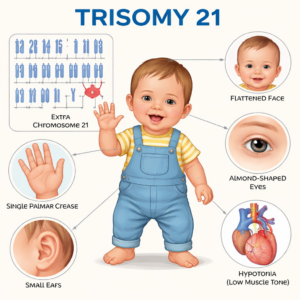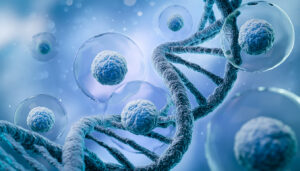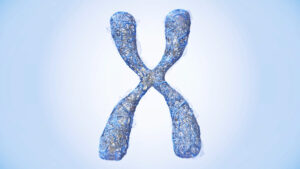Autosomal recessive inheritance refers to how some genetic changes, or rare diseases, are passed down from parents to their offspring.
With autosomal recessive inheritance, the precise chromosomes affected are autosomal. This means the gene mutation responsible for causing an autosomal recessive rare disease or disorder, is located on one of the first 22 non-sex chromosomes. The cells of the human body are made up of 46 chromosomes, in 23 pairs. Genes come in pairs – one is received from the mother and one from the father.
Autosomal recessive inheritance is when a person inherits two mutated genes from each of their parents. Both copies of the same gene are mutated. For this to happen, both parents must be carriers of the gene mutation. As carriers, they are unlikely to show any symptoms of a disorder.
Parents who are carriers of an autosomal recessive gene mutation will not necessarily have children who will develop a rare disease.
Their children will have a 25% chance of being born with two healthy genes (without any mutations), a 25% chance of inheriting both recessive, gene mutations (meaning the child will be affected by an autosomal recessive disorder), and a 50% chance of having a child who does not have any symptoms of a rare disorder, but who is a carrier of the same genetic mutation as their parents.
Autosomal recessive disorders
One of the most well-known autosomal recessive disorders is Tay-Sachs. This nervous system disease has a low life expectancy, with most affected individuals dying in early childhood. It is a progressive syndrome that leads to the degeneration of the body’s central nervous system. This rare disease is most common amongst those of European Ashkenazi Jewish descent.
Sickle cell disease is also an autosomal recessive disorder. Approximately 2 in 12 African Americans are carriers of this autosomal recessive gene mutation. This autosomal recessive disorder causes sticky and stiff red blood cells which makes it more difficult for them to move oxygen around the body. This in turn can cause other medical and health complications.
Autosomal recessive inheritance and genetic counseling
For autosomal recessive inheritance to be fully understood, in the context of what it means for an individual family, it is important to participate in genetic counseling sessions.
Genetic counseling can not only explain autosomal recessive inheritance, and what it means for parents who are carriers of an autosomal recessive gene mutation, it can also explain what this means for their potential children. It can explain the risks – from a genetic and medical perspective, and allow parents-to-be to explore their options. It will also walk parents through the different types and modes of genetic inheritance.
It can walk parents through the process of carrier screening, and prenatal genetic screening and testing, where necessary. Genetic counseling can also provide important information about autosomal recessive disorders, their symptoms, and possible treatment and therapies. This is an important support for families facing a rare disease diagnosis in a child.



